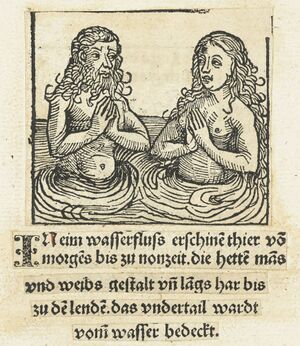Nereid: Difference between revisions
From Marinelexicon
No edit summary |
No edit summary |
||
| (One intermediate revision by one other user not shown) | |||
| Line 4: | Line 4: | ||
</gallery> | </gallery> | ||
{{HeaderEN}}<br /> | {{HeaderEN}}<br /> | ||
[[File:Zeemeerminnen.jpg|thumb|<small>Merman and mermaid or nereid. Woodprint, Germany, 1486 - 1493 [http://hdl.handle.net/10934/RM0001.COLLECT.30351 Rijksmuseum].</small>]] | |||
'''''Nereid''''' • Originally sea nymphs in Greek mythology, the 50 daughters of Nereus and Doris. In modern Greek folklore, the term has come to be used for all nymphs, fairies, or mermaids, not merely nymphs of the sea. | '''''Nereid''''' • Originally sea nymphs in Greek mythology, the 50 daughters of Nereus and Doris. In modern Greek folklore, the term has come to be used for all nymphs, fairies, or mermaids, not merely nymphs of the sea. | ||
<br /> | <br /> | ||
| Line 24: | Line 25: | ||
;Greek | ;Greek | ||
:Νεράιδα | :Νεράιδα | ||
[[no:Nereide]] | [[no:Nereide]] | ||
[[pt:Nereida]] | [[pt:Nereida]] | ||
[[Category:Mythical creature]] | [[Category:Mythical creature]] | ||
Latest revision as of 17:53, 14 May 2021
-
Português
-
Norsk
Marine Lexicon — Marine mammals — Mythical creatures — Activities related to marine mammals — Toponomy — Zooarchaeology — Historical sources — Cite Marine Lexicon

Nereid • Originally sea nymphs in Greek mythology, the 50 daughters of Nereus and Doris. In modern Greek folklore, the term has come to be used for all nymphs, fairies, or mermaids, not merely nymphs of the sea.
- English
- Nereid; Sea nymph
- Portuguese
- Nereida; Marinha
- Norwegian
- Nereide
- Dutch
- Nereïde
- German
- Nereïde
- French
- Néréide
- Spanish
- Nereida
- Italian
- Nereide
- Greek
- Νεράιδα

